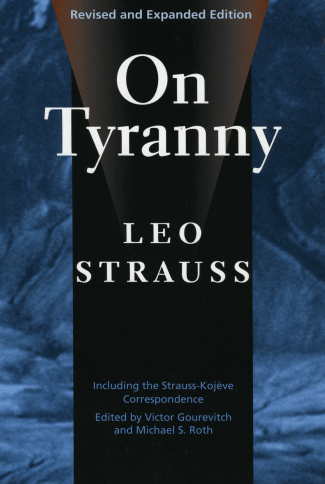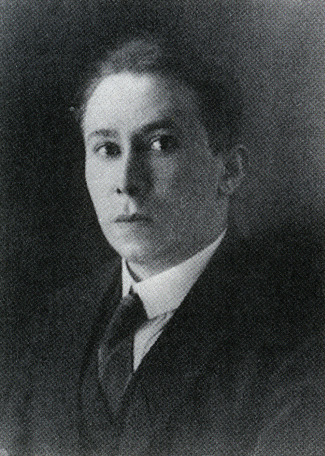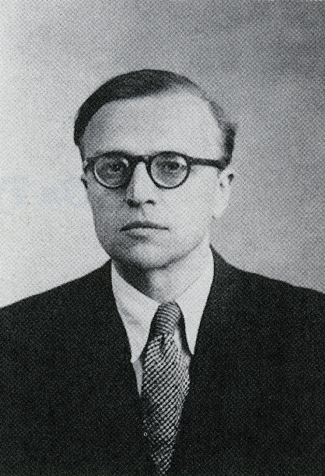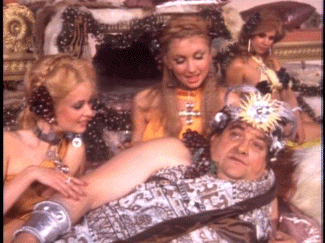by Leo Strauss
Revised and Expanded Edition Including the Strauss-Kojeve Correspondence
Edited by Victor Gourevitch and Michael S. Roth
© 1961, 1991, 2000 by the Estate of Leo Strauss
NOTICE: THIS WORK MAY BE PROTECTED BY COPYRIGHT
YOU ARE REQUIRED TO READ THE COPYRIGHT NOTICE AT THIS LINK BEFORE YOU READ THE FOLLOWING WORK, THAT IS AVAILABLE SOLELY FOR PRIVATE STUDY, SCHOLARSHIP OR RESEARCH PURSUANT TO 17 U.S.C. SECTION 107 AND 108. IN THE EVENT THAT THE LIBRARY DETERMINES THAT UNLAWFUL COPYING OF THIS WORK HAS OCCURRED, THE LIBRARY HAS THE RIGHT TO BLOCK THE I.P. ADDRESS AT WHICH THE UNLAWFUL COPYING APPEARED TO HAVE OCCURRED. THANK YOU FOR RESPECTING THE RIGHTS OF COPYRIGHT OWNERS.

Table of Contents:
• Preface and Acknowledgments
• Introduction
• I. On Tyranny
o Xenophon: Hiero or Tyrannicus
o Leo Strauss: On Tyranny
Introduction
I. The Problem
II. The Title and the Form
III. The Setting
IV. The Teaching Concerning Tyranny
V. The Two Ways of Life
VI. Pleasure and Virtue
VII. Piety and Law
o Notes to On Tyranny
• II. The Strauss-Kojeve Debate
o Alexandre Kojeve: Tyranny and Wisdom
o Leo Strauss: Restatement on Xenophon's Hiero
• III. The Strauss-Kojeve Correspondence
o Letters
o Editorial Notes
o Name Index
o Subject Index
We have therefore to consider whether the thesis that tyranny can live up to the highest political standard is defensible on the basis of Xenophon's, or Socrates', political philosophy.
To begin with, it must appear most paradoxical that Xenophon should have had any liking whatsoever for tyranny however good. Tyranny at its best is still rule without laws and, according to Socrates' definition, justice is identical with legality or obedience to laws. Thus tyranny in any form seems to be irreconcilable with the requirement of justice. On the other hand, tyranny would become morally possible if the identification of "just" and "legal" were not absolutely correct, or if "everything according to law were (only) somehow () just." The laws which determine what is legal are the rules of conduct upon which the citizens have agreed. "The citizens" may be "the multitude" or "the few"; "the few" may be the rich or the virtuous. That is to say, the laws, and hence what is legal, depend on the political order of the community for which they are given. Could Xenophon or his Socrates have believed that the difference between laws depending on a faulty political order and laws depending on a good political order is wholly irrelevant as far as justice is concerned? Could they have believed that rules prescribed by a monarch, i.e., not by "the citizens," cannot be laws? Besides, is it wholly irrelevant for justice whether what the laws prescribe is reasonable or unreasonable, good or bad? Finally, is it wholly irrelevant for justice whether the laws enacted by the legislator (the many, the few, the monarch) are forcibly imposed on, or voluntarily agreed to by, the other members of the community? Questions such as these are not raised by Xenophon, or his Socrates, but only by Xenophon's young and rash Alcibiades who, however, was a pupil of Socrates at the time when he raised those questions; only Alcibiades, and not Socrates, is presented by Xenophon as raising the Socratic question, "What is law?" Socrates' doubt of the unqualified identification of justice and legality is intimated, however, by the facts that, on the one hand, he considers an enactment of the "legislator" Critias and his fellows a "law" which, he says, he is prepared to obey; and that, on the other hand, he actually disobeys it because it is "against the laws." But apart from the consideration that the identification of "just" and "legal" would make impossible the evidently necessary distinction between just and unjust laws, there are elements of justice which necessarily transcend the dimension of the legal. Ingratitude, e.g., while not being illegal, is unjust. The justice in business dealings -- Aristotle's commutative justice proper -- which is possible under a tyrant, is for this very reason not essentially dependent on law. Xenophon is thus led to suggest another definition, a more adequate definition, of justice. According to it, the just man is a man who does not hurt anyone, but helps everyone who has dealings with him. To be just, in other words, simply means to be beneficent. If justice is then essentially translegal, rule without laws may very well be just: beneficent absolute rule is just. Absolute rule of a man who knows how to rule, who is a born ruler, is actually superior to the rule of laws, in so far as the good ruler is "a seeing law," and laws do not "see," or legal justice is blind. Whereas a good ruler is necessarily beneficent, laws are not necessarily beneficent. To say nothing of laws which are actually bad and harmful, even good laws suffer from the fact that they cannot "see." Now, tyranny is absolute monarchic rule. Hence the rule of an excellent tyrant is superior to, or more just than, rule of laws. Xenophon's realization of the problem of law, his understanding of the essence of law, his having raised and answered the Socratic question, "What is law?" enables and compels him to grant that tyranny may live up to the highest political standard. His giving, in the Hiero, a greater weight to the praise of tyranny than to the indictment of tyranny is then more than an accidental consequence of his decision to present the teaching concerning tyranny in the form of a dialogue.
***
The meaning of this difference is indicated by Simonides in his praise of the beneficent ruler. The beneficent ruler will be loved by his subjects, he will be passionately desired by human beings, he will have earned the affectionate regard of many cities, whereas he will be praised by all human beings and will be admirable in the eyes of all. Everyone present, but not everyone absent, will be his ally, just as not everyone will be afraid that something might happen to him and not everyone will desire to serve him. Precisely by making his city happy, he will antagonize and hurt her enemies who cannot be expected to love him and to extol his victory. But even the enemies will have to admit that he is a great man: they will admire him and praise his virtue. The beneficent ruler will be praised and admired by all men, whereas he will not be loved by all men: the range of love is more limited than that of admiration or praise. Each man loves what is somehow his own, his private possession; admiration or praise is concerned with the excellent regardless of whether it is one's own or not. Love as distinguished from admiration requires proximity. The range of love is limited not only in regard to space, but likewise -- although Xenophon's Simonides in his delicacy refrains from even alluding to it -- in regard to time. A man may be admired many generations after his death whereas he will cease to be loved once those who knew him well are dead. Desire for "inextinguishable fame," as distinguished from desire for love, enables a man to liberate himself from the shackles of the Here and Now. The beneficent ruler is praised and admired by all men, whereas he is loved mainly by his subjects: the limits of love coincide normally with the borders of the political community, whereas admiration of human excellence knows no boundaries. The beneficent ruler is loved by those whom he benefits or serves on account of his benefits or services, whereas he is admired even by those to whom he has done the greatest harm and certainly by many whom he did not serve or benefit at all: admiration seems to be less mercenary than love. Those who admire the beneficent ruler while loving him do not necessarily make a distinction between their benefactor and the man of excellence; but those who admire him without loving him -- e.g., the enemy cities -- rise above the vulgar error of mistaking one's benefactor for the man of excellence. Admiration is as much superior to love as the man of excellence is to one's benefactor as such. To express this somewhat differently, love has no criterion of its relevance outside itself, but admiration has. If admiration does not presuppose services rendered by the admired to the admirer, one is led to wonder whether it presupposes any services, or any prospect of services, by the admired at all. This question is answered explicitly in the affirmative by Hiero, and tacitly in the negative by Simonides. Hiero is right as regards the ruler: the ruler does not gain the admiration of all men but by rendering services to his subjects. Simonides is right as regards the wise man: the wise man is admired, not on account of any services which he renders to others, but simply because he is what he is. The wise man need not be a benefactor at all in order to be admired as a man of excellence. More precisely: the specific function of the ruler is to be beneficent; he is essentially a benefactor; the specific function of the wise man is to understand; he is a benefactor only accidentally. The wise man is as self-sufficient as is humanly possible; the admiration which he gains is essentially a tribute to his perfection, and not a reward for any services. The desire for praise and admiration as distinguished and divorced from the desire for love is the natural foundation for the predominance of the desire for one's own perfection. This is what Xenophon subtly indicates by presenting Simonides as chiefly interested in the pleasures of eating, whereas Hiero appears to be chiefly interested in the pleasures of sex: for the enjoyment of food, as distinguished from sexual enjoyments, one does not need other human beings.
***
That examination leads to the conclusion suggested by Hiero that friendship has a higher value than city or fatherland or patriotism. Friendship, i.e., being loved and cared for by the small number of human beings whom one knows intimately (one's nearest relatives and companions) is not only "a very great good"; it is also "very pleasant." It is a very great good because it is intrinsically pleasant. Trust, i.e., one's trusting others, is "a great good." It is not a very great good, because it is not so much intrinsically pleasant as the conditio sine qua non of intrinsically pleasant relations. A man whom one trusts is not yet a friend: a servant or a bodyguard must be trustworthy, but there is no reason why they ought to be one's friends. While trust is not intrinsically pleasant, it stands in a fairly close relation to pleasure: when discussing trust, Hiero mentions pleasure three times. On the other hand, in the passage immediately following in which he discusses "fatherlands," he does not mention pleasure at all. Not only are "fatherlands" not intrinsically pleasant, they do not even stand in a close relation to pleasure. "Fatherlands are worth very much" because the citizens afford each other protection without pay against violent death and thus enable each citizen to live in safety. That for which the fatherland is "worth very much" is life in safety; safety, or freedom from fear, the spoiler of all pleasures, is the conditio sine qua non of every pleasure however insignificant; but to live in safety and to live pleasantly are clearly two different things. More precisely, the fatherland is not, as is trust, the specific condition of the great pleasures deriving from friendship: "strangers," men like Simonides, may enjoy friendship. Friendship and trust are good for human beings as such, but the cities are good primarily, not to say exclusively, for the citizens and the rulers; they are certainly less good for strangers, and still less for slaves. The fatherland, or the city, is good for the citizens because it liberates them from fear. This does not mean that it abolishes fear; it rather replaces one kind of fear (the fear of enemies, evil-doers, and slaves) by another (the fear of the laws or of the law-enforcing authorities). The city, as distinguished from friendship and trust, is not possible without compulsion; and compulsion, constraint, or necessity () is essentially unpleasant. Friendship, i.e., being loved, is pleasant, while being patriotic is necessary. While friendship, as praised by Hiero, is not only pleasant but also good, its goodness is not moral goodness or nobility
***
I do not believe in the possibility of a conversation of Socrates with the people (it is not clear to me what you think about this); the relation of the philosopher to the people is mediated by a certain kind of rhetoricians who arouse fear of punishment after death; the philosophers can guide these rhetoricians but cannot do their work.
***
I am one of those who refuse to go through open doors when one can enter just as well through a keyhole....Only a teleological concept of nature can help out here.... As regards p. 13 of the Restatement (Hitler), I am perfectly ready to strike the three sentences in the middle of the paragraph: "As is shown by his reference...under his rule." But I cannot accept your suggestion to replace "good tyranny" with some other expression....I particularly liked your sensible comment about the old women or the adolescents who call themselves philosophers and savor their "tragic" condition instead of making an effort like reasonable people....I believe that you underestimate the positive side of manliness; in the Republic everyone is just and moderate, but only the elite is manly (and wise); manliness and wisdom belong together...This attracts me as every ingenious malice would....The primary correction, therefore, is this: if philosophy's quest is for the knowledge of the whole, and if the whole must be understood in the light of ideas, there must be ideas of "everything."... My general reaction to your statements is that we are poles apart. The root of the question is I suppose the same as it always was, that you are convinced of the truth of Hegel (Marx) and I am not. You have never given me an answer to my questions: a) was Nietzsche not right in describing the Hegelian-Marxian end as "the last man"? and b) what would you put into the place of Hegel's philosophy of nature?...I am looking forward with the utmost interest to your history of pagan philosophy. I am glad to see that, as is indicated by the adjective, you have returned to the faith of your fathers. -- Strauss
***
Enclosed a picture of Hitler which -- in my opinion -- explains a great deal: the man is really very congenial and "cozy....Be that as it may, Theatetus is nevertheless depicted as philosophically "dumb" and a "chatter-box" ("amateur-philosopher" in the manner of Einstein).... only when the body is "negated" does the soul become "pure" idea, and only man can "negate" his body (on the basis of diairesis without koinonia, which precisely allows the body to be understood as non-A, where the Non, which appears as space-time, is derived from the non-existing dyad.)...Proclus himself was the originator of many previously unknown doctrines in natural, intellectual and even more divine subjects. He was the first to claim that there was a genus of souls who were able to perceive many Ideas at one time and who occupied a middle position between the Nous which knows everything at once and those souls who can concentrate upon only one Idea at a time....In regard to this he had the following wonderful dream: the great Plutarch [Syriannus's teacher] appeared to him and foretold that he would live for as many years as there were four-page sheets in his works on the oracles; afterwards he counted these and found that there were 70. That the dream had been divine was proved by the close of his life. For although he really lived, as was said before, for 75 years, during the last five years he was no longer strong. To be sure, he still prayed, even in this condition, composed hymns, but he did everything in accordance with this weakened condition so that he marvelled whenever he thought of the dream and constantly said: "I have really lived for only 70 years ...Proclus proceeded step by step; first he was cleansed by the Chaldean purification; then he held converse, as he himself mentions in one of his works, with the luminous apparitions of Hecate which he conjured up himself; then he caused rain-falls by correctly moving the wry-neckbird wheel, by this means he saved Athens from a severe drought. He proposed means to prevent earthquakes; he tested the divinatory power of the tripod; and even wrote verses about his own destiny...I was afraid lest, in the words of Ibycus, I might win the esteem of men by sinning, not against the gods, as he said, but against a wise man [sc. Proclus], especially since it would not have been right that I alone of all his friends should keep silent and should not, on the contrary, make every effort to tell the truth about him, in spite of the fact that of all men I was under the greatest obligation to speak out openly. Perhaps, in fact, I might not have even won men's esteem, because they would not have attributed to modesty my refusal to undertake this task but to mental laziness or even a worse fault of soul. For all these reasons, therefore, I felt myself compelled to set forth at least some of the countless superior accomplishments of the philosopher Proclus and some of the things that have been truly reported about him....This genuinely platonic conception was tried ("monks") for a thousand years (by both Christians and Muslims), and degenerated into Bayle's Republic of Letters which remains "alive" to this day. Betrayal of the Intellectuals). Genuine politicians (statesmen) were always opposed to this (as Julian already was): namely, what Plato may really have meant was of no concern to them, and what they (mis)understood of Plato was naturally "utopian" (because it could only be carried out by a "superhuman" tyranny). That is how it stood until Hegel-Marx: for they did not want either to destroy the Academy (= "monasteries") or to render them inactive and ineffectual, but wanted on the contrary to transform them into a "polis."...Julian was of the opinion (as were Dam<ascius> and Farabi) that Plato thought exactly as they did, and only never said so openly. -- Kojeve
***
Constitutional" authority ought to be given to the equitable men (epieikeis), i.e., to gentlemen -- preferably an urban patriciate which derives its income from the cultivation of its landed estates. It is true that it is at least partly a matter of accident -- of the accident of birth -- whether a given individual does or does not belong to the class of gentlemen and has thereby had an opportunity of being brought up in the proper manner. But in the absence of absolute rule of the wise on the one hand, and on the other hand of a degree of abundance which is possible only on the basis of unlimited technological progress with all its terrible hazards, the apparently just alternative to aristocracy open or disguised will be permanent revolution, i.e., permanent chaos in which life will be not only poor and short but brutish as well.
***
The philosopher's dominating passion is the desire for truth, i.e., for knowledge of the eternal order, or the eternal cause or causes of the whole. As he looks up in search for the eternal order, all human things and all human concerns reveal themselves to him in all clarity as paltry and ephemeral, and no one can find solid happiness in what he knows to be paltry and ephemeral. He has then the same experience regarding all human things, nay, regarding man himself, which the man of high ambition has regarding the low and narrow goals, or the cheap happiness, of the general run of men. The philosopher, being the man of the largest views, is the only man who can be properly described as possessing megaloprepreia (which is commonly rendered by "magnificence") (Plato, Republic 486a). Or, as Xenophon indicates, the philosopher is the only man who is truly ambitious. Chiefly concerned with eternal beings, or the "ideas," and hence also with the "idea" of man, he is as unconcerned as possible with individual and perishable human beings and hence also with his own "individuality," or his body, as well as with the sum total of all individual human beings and their "historical" procession. He knows as little as possible about the way to the market place, to say nothing of the market place itself, and he almost as little knows whether his very neighbor is a human being or some other animal (Plato, Theaetetus 173c8-dl, 174bl-6).
But if the philosopher is radically detached from human beings as human beings, why does he communicate his knowledge, or his questionings, to others? Why was the same Socrates, who said that the philosopher does not even know the way to the market place, almost constantly in the market place? Why was the same Socrates, who said that the philosopher barely knows whether his neighbor is a human being, so well informed about so many trivial details regarding his neighbors? The philosopher's radical detachment from human beings must then be compatible with an attachment to human beings. While trying to transcend humanity (for wisdom is divine) or while trying to make it his sole business to die and to be dead to all human things, the philosopher cannot help living as a human being who as such cannot be dead to human concerns, although his soul will not be in these concerns.
The philosopher cannot devote his life to his own work if other people do not take care of the needs of his body. Philosophy is possible only in a society in which there is "division of labor." The philosopher needs the services of other human beings and has to pay for them with services of his own if he does not want to be reproved as a thief or fraud. But man's need for other men's services is founded on the fact that man is by nature a social animal or that the human individual is not self-sufficient. There is therefore a natural attachment of man to man which is prior to any calculation of mutual benefit. This natural attachment to human beings is weakened in the case of the philosopher by his attachment to the eternal beings. On the other hand, the philosopher is immune to the most common and the most powerful dissolvent of man's natural attachment to man, the desire to have more than one has already and in particular to have more than others have; for he has the greatest self-sufficiency which is humanly possible. Hence the philosopher will not hurt anyone. While he cannot help being more attached to his family and his city than to strangers, he is free from the delusions bred by collective egoisms; his benevolence or humanity extends to all human beings with whom he comes into contact. (Memorabilia 12.60-61; 6.10; IV 8.11.) Since he fully realizes the limits set to all human action and all human planning (for what has come into being must perish again), he does not expect salvation or satisfaction from the establishment of the simply best social order. He will therefore not engage in revolutionary or subversive activity. But he will try to help his fellow man by mitigating, as far as in him lies, the evils which are inseparable from the human condition. (Plato, Theaetetus 176a5-b1; Seventh Letter 331c7-d5; Aristotle, Politics 130la39-b2.) In particular, he will give advice to his city or to other rulers. Since all advice of this kind presupposes comprehensive reflections which as such are the business of the philosopher, he must first have become a political philosopher. After this preparation he will act as Simonides did when he talked to Hiero, or as Socrates did when he talked to Alcibiades, Critias, Charmides, Critobulus, the younger Pericles and others....
The philosopher's attempt to grasp the eternal order is necessarily an ascent from the perishable things which as such reflect the eternal order. Of all perishable things known to us, those which reflect that order most, or which are most akin to that order, are the souls of men. But the souls of men reflect the eternal order in different degrees. A soul that is in good order or healthy reflects it to a higher degree than a soul that is chaotic or diseased. The philosopher who as such has had a glimpse of the eternal order is therefore particularly sensitive to the difference among human souls. In the first place, he alone knows what a healthy or well-ordered soul is. And secondly, precisely because he has had a glimpse of the eternal order, he cannot help being intensely pleased by the aspect of a healthy or well-ordered soul, and he cannot help being intensely pained by the aspect of a diseased or chaotic soul, without regard to his own needs or benefits. Hence he cannot help being attached to men of well-ordered souls: he desires "to be together" with such men all the time. He admires such men not on account of any services which they may render to him but simply because they are what they are. On the other hand, he cannot help being repelled by ill-ordered souls. He avoids men of ill-ordered souls as much as he can, while trying of course not to offend them. Last but not least, he is highly sensitive to the promise of good or ill order, or of happiness or misery, which is held out by the souls of the young. Hence he cannot help desiring, without any regard to his own needs or benefits, that those among the young whose souls are by nature fitted for it, acquire good order of their souls. But the good order of the soul is philosophizing. The philosopher therefore has the urge to educate potential philosophers simply because he cannot help loving well-ordered souls.
-- On Tyranny, by Leo Strauss
The Universal & Homogenous State, by Tara Carreon




 , love returned on the part of the beloved. Hiero maintains a distinction throughout this passage (29-end) between the
, love returned on the part of the beloved. Hiero maintains a distinction throughout this passage (29-end) between the  , (erotic or passionate Jove) which is not engendered on his part and the
, (erotic or passionate Jove) which is not engendered on his part and the  (love, liking, friendship) which is not returned by the beloved. The parallel to
(love, liking, friendship) which is not returned by the beloved. The parallel to  in 29 supra. Note by M.K. >
in 29 supra. Note by M.K. > . No other work contained in the Corpus Xenophanteum has a title consisting of both a proper name and an adjective referring to the subject. The first part of the title is reminiscent of the title of the Agesilaus. The Agesilaus deals with an outstanding Greek king, just as the Hiero deals with an outstanding Greek tyrant. Proper names of individuals also occur in the titles of the Cyri Institutio, the Cyri Expeditio, and the Apologia Socratis. Agesilaus, the two Cyruses, and Socrates seem to be the men Xenophon admired most. But the two Cyruses were not Greek, and Socrates was not a ruler: the Agesilaus and the Hiero, the only writings of Xenophon the titles of which contain proper names of individuals in the nominative, are the only writings of Xenophon which may be said to be devoted to Greek rulers.
. No other work contained in the Corpus Xenophanteum has a title consisting of both a proper name and an adjective referring to the subject. The first part of the title is reminiscent of the title of the Agesilaus. The Agesilaus deals with an outstanding Greek king, just as the Hiero deals with an outstanding Greek tyrant. Proper names of individuals also occur in the titles of the Cyri Institutio, the Cyri Expeditio, and the Apologia Socratis. Agesilaus, the two Cyruses, and Socrates seem to be the men Xenophon admired most. But the two Cyruses were not Greek, and Socrates was not a ruler: the Agesilaus and the Hiero, the only writings of Xenophon the titles of which contain proper names of individuals in the nominative, are the only writings of Xenophon which may be said to be devoted to Greek rulers.
 [3] and in fact Simonides does therein teach Hiero how best to exercise tyrannical rule.
[3] and in fact Simonides does therein teach Hiero how best to exercise tyrannical rule. (Ways and Means). The purpose of that work is to show the (democratic) rulers of Athens how they could become more just by showing them how they could overcome the necessity under which they found themselves of acting unjustly. [4] That is to say, its purpose is to show how the democratic order of Athens could be improved without being fundamentally changed. Similarly, Simonides shows the tyrannical ruler of Syracuse how he could overcome the necessity of acting unjustly under which he found himself without abandoning tyrannical rule as such. [5] Xenophon, the pupil of Socrates, seems to have considered both democracy and tyranny faulty regimes. [6] The Ways and Means and the Hiero are the only works of Xenophon which are devoted to the question of how a given political order (
(Ways and Means). The purpose of that work is to show the (democratic) rulers of Athens how they could become more just by showing them how they could overcome the necessity under which they found themselves of acting unjustly. [4] That is to say, its purpose is to show how the democratic order of Athens could be improved without being fundamentally changed. Similarly, Simonides shows the tyrannical ruler of Syracuse how he could overcome the necessity of acting unjustly under which he found himself without abandoning tyrannical rule as such. [5] Xenophon, the pupil of Socrates, seems to have considered both democracy and tyranny faulty regimes. [6] The Ways and Means and the Hiero are the only works of Xenophon which are devoted to the question of how a given political order ( ) of a faulty character could be corrected without being transformed into a good political order.
) of a faulty character could be corrected without being transformed into a good political order.

 ...
...










 ) and not by fear.
) and not by fear. . This is not insignificant because in the only remark of that kind which occurs in the Hiero, Xenophon notes that Simonides made a certain statement -- it concerns Hiero's love affairs -- "laughingly"; Hiero is always serious. [5] Simonides, who never mentions courage (
. This is not insignificant because in the only remark of that kind which occurs in the Hiero, Xenophon notes that Simonides made a certain statement -- it concerns Hiero's love affairs -- "laughingly"; Hiero is always serious. [5] Simonides, who never mentions courage ( ), [6] once mentions moderation (
), [6] once mentions moderation ( ) which is never mentioned by Hiero. On the other hand, Hiero uses the terms
) which is never mentioned by Hiero. On the other hand, Hiero uses the terms  and
and  ; which are never used by Simonides. [7]
; which are never used by Simonides. [7] (and derivates) occurs relatively much more frequently in the second part (9 times) than in the first part (4 times).
(and derivates) occurs relatively much more frequently in the second part (9 times) than in the first part (4 times).  (and derivatives) occurs relatively less frequently in the second part (9 times) than in the first part (16 times).
(and derivatives) occurs relatively less frequently in the second part (9 times) than in the first part (16 times). and the
and the  with regard to pleasures and perceptions. [14] When mentioning the pleasure deriving from sleep, he does not limit himself to pointing out that sleep is unambiguously pleasant; he raises in addition the theoretical question of how and by what and when we enjoy sleep; since he feels that he cannot answer this question, he explains why it is so particularly difficult to answer it.
with regard to pleasures and perceptions. [14] When mentioning the pleasure deriving from sleep, he does not limit himself to pointing out that sleep is unambiguously pleasant; he raises in addition the theoretical question of how and by what and when we enjoy sleep; since he feels that he cannot answer this question, he explains why it is so particularly difficult to answer it.